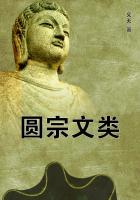A judge has a case to decide, in which one of the parties is his friend, and the other his enemy.Should he, in this instance, prefer his INTIMATE ASSOCIATE to his DISTANT ASSOCIATE; and decide the case in favor of his friend, in spite of evidence to the contrary? No: for, if he should favor his friend's injustice, he would become his accomplice in his violation of the social compact; he would form with him a sort of conspiracy against the social body.Preference should be shown only in personal matters, such as love, esteem, confidence, or intimacy, when all cannot be considered at once.Thus, in case of fire, a father would save his own child before thinking of his neighbor's; but the recognition of a right not being an optional matter with a judge, he is not at liberty to favor one person to the detriment of another.
The theory of these special societies--which are formed concentrically, so to speak, by each of us inside of the main body--gives the key to all the problems which arise from the opposition and conflict of the different varieties of social duty,--problems upon which the ancient tragedies are based.
The justice practised among animals is, in a certain degree, negative.With the exception of protecting their young, hunting and plundering in troops, uniting for common defence and sometimes for individual assistance, it consists more in prevention than in action.A sick animal who cannot arise from the ground, or an imprudent one who has fallen over a precipice, receives neither medicine nor nourishment.If he cannot cure himself, nor relieve himself of his trouble, his life is in danger: he will neither be cared for in bed, nor fed in a prison.
Their neglect of their fellows arises as much from the weakness of their intellect as from their lack of resources.Still, the degrees of intimacy common among men are not unknown to the animals.They have friendships of habit and of choice;friendships neighborly, and friendships parental.In comparison with us, they have feeble memories, sluggish feelings, and are almost destitute of intelligence; but the identity of these faculties is preserved to some extent, and our superiority in this respect arises entirely from our understanding.
It is our strength of memory and penetration of judgment which enable us to multiply and combine the acts which our social instinct impels us to perform, and which teaches us how to render them more effective, and how to distribute them justly.The beasts who live in society practise justice, but are ignorant of its nature, and do not reason upon it; they obey their instinct without thought or philosophy.They know not how to unite the social sentiment with the idea of equality, which they do not possess; this idea being an abstract one.We, on the contrary, starting with the principle that society implies equality, can, by our reasoning faculty, understand and agree with each other in settling our rights; we have even used our judgment to a great extent.But in all this our conscience plays a small part, as is proved by the fact that the idea of RIGHT--of which we catch a glimpse in certain animals who approach nearer than any others to our standard of intelligence--seems to grow, from the low level at which it stands in savages, to the lofty height which it reaches in a Plato or a Franklin.If we trace the development of the moral sense in individuals, and the progress of laws in nations, we shall be convinced that the ideas of justice and legislative perfection are always proportional to intelligence.The notion of justice--which has been regarded by some philosophers as simple--is then, in reality, complex.It springs from the social instinct on the one hand, and the idea of equality on the other; just as the notion of guilt arises from the feeling that justice has been violated, and from the idea of free-will.
In conclusion, instinct is not modified by acquaintance with its nature; and the facts of society, which we have thus far observed, occur among beasts as well as men.We know the meaning of justice; in other words, of sociability viewed from the standpoint of equality.We have met with nothing which separates us from the animals.
% 3.--Of the third degree of Sociability.
The reader, perhaps, has not forgotten what was said in the third chapter concerning the division of labor and the speciality of talents.The sum total of the talents and capacities of the race is always the same, and their nature is always similar.We are all born poets, mathematicians, philosophers, artists, artisans, or farmers, but we are not born equally endowed; and between one man and another in society, or between one faculty and another in the same individual, there is an infinite difference.
This difference of degree in the same faculties, this predominance of talent in certain directions, is, we have said, the very foundation of our society.Intelligence and natural genius have been distributed by Nature so economically, and yet so liberally, that in society there is no danger of either a surplus or a scarcity of special talents; and that each laborer, by devoting himself to his function, may always attain to the degree of proficiency necessary to enable him to benefit by the labors and discoveries of his fellows.Owing to this simple and wise precaution of Nature, the laborer is not isolated by his task.He communicates with his fellows through the mind, before he is united with them in heart; so that with him love is born of intelligence.
It is not so with societies of animals.In every species, the aptitudes of all the individuals--though very limited--are equal in number and (when they are not the result of instinct) in intensity.Each one does as well as all the others what all the others do; provides his food, avoids the enemy, burrows in the earth, builds a nest, &c.No animal, when free and healthy, expects or requires the aid of his neighbor; who, in his turn, is equally independent.














